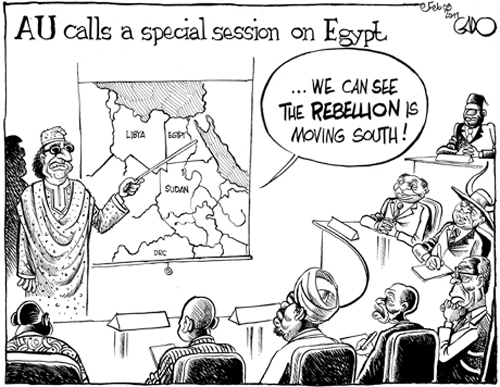
In the last several years significant revolutions happened in Kenya, the Sudan and Ivory Coast, and now Tunisia and Egypt. Africa is on the move; it’s changing faster than we understand.
No surprise to me. Just how fast it’s happening is what boggles the mind. It all seemed to begin with the end of apartheid in South Africa. That was a journey for those liberating that struggle that spanned a lifetime – not exactly fast.
Next in line was the Sudan, a troubled place to be sure, but the actual revolution that has led to a new country started only 6 years ago – again, not supersonic, but speeding up.
Then came Kenya. It’s revolution started in December, 2007, after a failed election and essentially came to fruition with a radically new constitution in August, 2010. Getting faster.
A failed election in the Ivory Coast has that country yet in the throes of radical change. Then Tunisia changed over a few weekends, and now Egypt, yet to play fully out.
The momentum for change has snowballed. And there are quite a few countries left. Tremors are being felt in Tanzania, Uganda, Algeria, Jordan and even sleepy cozy Morocco. If there were more people in Botswana, they would already have had a revolution, there, but instead a shouting match in Parliament will have to do.
What is happening? Dare I ask if Obama’s IT techniques to excite youth is now a model worldwide?
Writing in Kenya’s Daily Nation last week, Catholic University of East Africa professor Maurice Amutabi answered, “Though … Obama is the first known leader to successfully use the Internet … to ascend to power, his success is being emulated all over.”
“Students of history and political science are thrilled by the people power in Tunisia and Egypt. We have not seen anything like it before. It makes the Storming of the Bastille during the French Revolution look ordinary.”
Amutabi delves into this a little bit further. Motivated by less than 144 character tweets, it’s not exactly possible to rally an ideology. People power grows around very narrow goals:
Amutabi knows that the new, youthful forces “have nothing to do with religious zeal or fanaticism.” In fact, he claims, “These crowds do not have any ideology, apart from the fact that they want a change…”
YES WE CAN
CHANGE WE CAN DEPEND ON
.. are both sweet little tweets.
I was so intrigued by Amutabi’s oped that I emailed him for a further analysis. If such narrow goals can bring down governments that have been in power for portions of centuries, and if they’re done so by tweets, what comes next? What happens once people power succeeds?
Amutabi believes that the “tech-savvy” youth will continue to use their technique to vet leaders with greater depth “who are progressive enough to represent the interests of a wider of spectrum of society. The youth have a better chance to consult and reach a consensus on who is a good leader, largely because of ICT.”
Amutabi believes that current leaders arose to power on a series of misrepresentations of themselves. We all know the slogans of politicians worldwide: “This is what the people want me to do” etc etc. “I was elected by the people to” whatever.
Amutabi believes that today’s “information flow is faster and leaders cannot hide their true selves… People get to know about them long before they become prominent.”
So not just a small coterie of investigative journalists and their elite readers would have known that George Bush was a drunk and bankrupt sports club owner? And that would have done the trick?
Perhaps. Although I fear Amutabi’s enthusiasm for the current revolutionary change might discount too heavily an entrenched politic’s capacity to ignore the truth. In America even today there remains a sizeable portion of society who believes Obama was not born here.
But what I found most exciting if unsettling about Amutabi’s beliefs is once people power succeeds and puts its leaders in power, then what?
Must internet polling be used to pass every piece of legislation, for instance?
Will the populations expect to be consulted on every major issue that previously governments decided on their own?
“Yes,” Amutabi answered without hesitation. “The populations are alert to any changes and would demand accountability and transparency…. They have acquired new meaning of their power and gained a taste of strength in numbers and will not look back.”
Wow. This makes California referendums look like grade school elections for what dessert should be served for lunch.
“I believe they will push all the time until they get what they want,” Amutabi concludes. “The political landscape in Africa might never be the same again.”
Or anywhere there’s a smart phone.
Government by smart phone? Not likely. It takes a major issue to get enough people involved in it to make a difference, but it certainly could ensure transparency on issues simple enough for tweets and emotional enough to get people upset.
How large a role will college education play? Along with smart phones, will we also get educated leaders in Africa?